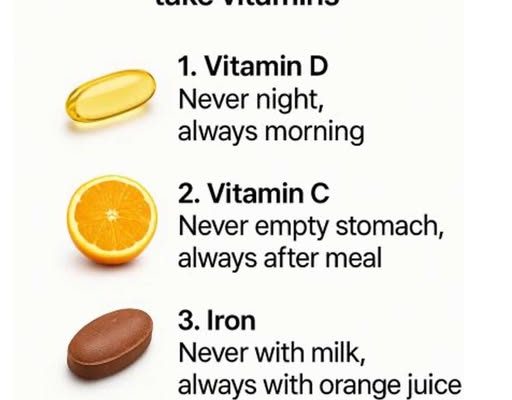In the quest for better health, vitamins play a crucial role. They are essential nutrients our bodies need to function correctly. However, many people do not realize that the timing and method of taking vitamins can significantly impact their efficacy. Taking vitamins at the wrong time or in the wrong way can lead to poor absorption and wasted resources.
Understanding the science behind vitamin absorption can help you optimize your intake. Whether you’re taking vitamins to fill a dietary gap, boost immunity, or support specific health goals, knowing the best practices can ensure you get the most out of your supplements. This article will guide you through the right way to take your vitamins for maximum benefit.
1. Why Timing Matters for Vitamin Absorption
The timing of vitamin intake is crucial because it affects how well they’re absorbed in the body. Some vitamins are absorbed better with food, while others need an empty stomach. For instance, fat-soluble vitamins like A, D, E, and K require dietary fats for optimal absorption, making it best to take them with meals containing healthy fats.
Water-soluble vitamins, such as vitamin C and the B-vitamins, are absorbed more efficiently on an empty stomach. However, taking them with food can lessen the risk of stomach upset. Ensuring you take your vitamins at the right time can maximize their effectiveness and prevent unnecessary waste.
2. Vitamin D: Never Night, Always Morning
Vitamin D is crucial for bone health and immune function, yet many people take it at night, which is not ideal. Studies have shown that vitamin D may interfere with sleep if taken in the evening. This vitamin is better absorbed in the morning, preferably with breakfast, as exposure to sunlight can enhance its absorption.
The recommended daily allowance for vitamin D is 600 to 800 IU for most adults, but some individuals may need more depending on their health status and exposure to sunlight. Taking vitamin D in the morning ensures you align with your body’s natural rhythms and optimize its absorption.
3. Vitamin C: Never Empty Stomach, Always After Meal
Vitamin C is a powerful antioxidant that supports the immune system and helps in collagen synthesis. Taking vitamin C on an empty stomach can lead to gastrointestinal discomfort, such as nausea and diarrhea. To avoid this, it’s best to take vitamin C after a meal.
By consuming vitamin C with food, you not only enhance its absorption but also reduce the risk of stomach upset. The recommended daily amount is 65 to 90 mg for adults, but during illness or stress, higher doses may be beneficial, always ensuring they’re taken post-meal.
4. Iron: Never With Milk, Always With Orange Juice
Iron is essential for producing red blood cells and transporting oxygen throughout the body. However, its absorption can be significantly hindered by calcium-rich foods like milk and dairy products. Instead, pairing iron supplements with vitamin C-rich foods, like orange juice, enhances its absorption.
The recommended daily intake of iron varies by age and gender, with adult women needing 18 mg and men requiring 8 mg. By taking iron supplements with a glass of orange juice, you can boost its absorption by up to four times compared to taking it with water or milk.
5. Calcium: Never With Iron, Always Alone
Calcium is vital for bone health, but it competes with iron for absorption. Therefore, it’s important not to take calcium and iron supplements together. Instead, calcium should be taken separately, ideally at a different time of day.
For optimal absorption, calcium should be taken in doses of no more than 500 mg at a time, as the body cannot absorb larger amounts efficiently. It’s best to spread intake throughout the day, perhaps with meals, to maximize its benefits and avoid interference with other minerals.
6. The Importance of Consistency in Supplementation
Consistency is key when it comes to supplementing with vitamins. Regular intake helps maintain steady levels of nutrients in the body, which is crucial for their effectiveness. For example, taking a vitamin B complex at the same time each day ensures your body has a constant supply of these energy-boosting nutrients.
Developing a routine can help you remember to take your supplements and make it easier to integrate them into your daily life. Whether it’s with breakfast, lunch, or dinner, finding a consistent time that works for you will enhance the benefits of your vitamin regimen.
7. How Food Choices Affect Vitamin Efficacy
The foods you consume alongside your vitamins can significantly affect their absorption and efficacy. For instance, fat-soluble vitamins need dietary fats for optimal absorption, so pairing them with avocado or nuts can enhance their uptake.
Conversely, certain foods can inhibit vitamin absorption. High-fiber foods, for example, can bind to certain vitamins and minerals and reduce their bioavailability. Being mindful of your food choices when taking vitamins can ensure you’re getting the full benefit from your supplements.
8. The Role of Fat-Soluble vs. Water-Soluble Vitamins
Fat-soluble vitamins, including vitamins A, D, E, and K, are stored in the body’s fatty tissue and liver. They do not need to be consumed as frequently as water-soluble vitamins, which are not stored in the body and need regular replenishment.
Water-soluble vitamins, such as vitamin C and the B-vitamins, are excreted through urine and require daily intake to maintain adequate levels. Understanding the difference between these types of vitamins can help you tailor your supplementation strategy for better health outcomes.
9. Avoiding Over-Supplementation and Its Risks
While vitamins are essential for health, more is not always better. Over-supplementation can lead to toxicity, particularly with fat-soluble vitamins that are stored in the body. For example, excessive vitamin A can cause liver damage and other health issues.
To avoid these risks, it’s important to adhere to recommended dosages and consult with a healthcare provider before significantly increasing vitamin intake. Regular blood tests can also help monitor your vitamin levels and prevent potential toxicity.
10. Understanding Interactions with Medications
Vitamins can interact with medications, affecting their efficacy or leading to adverse effects. For instance, vitamin K can interfere with blood thinners like warfarin, while certain antibiotics can reduce the absorption of vitamins B and K.
It’s crucial to discuss your vitamin regimen with a healthcare provider, especially if you’re on medication, to avoid negative interactions and ensure both your supplements and medications work effectively.
11. Popular Myths Debunked: What Science Really Says
There are many myths surrounding vitamin supplementation that can lead to misinformation and poor health choices. For example, the belief that vitamin C can prevent colds has been debunked, although it may reduce the duration of symptoms.
Another common myth is that all vitamins should be taken in the morning, but as we’ve seen, the timing depends on the type of vitamin. Science provides clear guidelines for effective supplementation, and staying informed can help you make the best decisions for your health.
Resources



